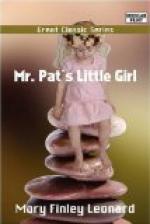“I was learning a hymn for grandmamma. Why didn’t you speak to me?”
“I didn’t know whether you’d like it.”
“Why, of course I should have liked it. I was beginning to think that day I should never get acquainted with any one, and I was feeling dreadfully lonesome when the magician came in.”
“The magician?” Maurice exclaimed. Certainly this was a singular girl who talked about magicians in an everyday tone.
Rosalind laughed. “I mean Morgan, who does cabinet work. Do you know him?”
“Everybody in Friendship knows Morgan. He is a good fellow, too. Why do you call him the magician?”
“Because that is what father called him when he was a little boy. Once when Morgan had made an old desk look like new, grandfather said he was a magician, and father, who heard him, thought he meant it really. Father and Uncle Allan used to play in his shop and talk on their fingers to him. Can you do that?”
“Why, yes; I’ll teach you if you like.”
“I should like it very much. It is so tiresome to write things.”
“Morgan is very clever, too, about understanding. You only begin to spell a word when he guesses what you want to say,” Maurice added.
“I went to his shop the other day with Miss Herbert, but she wouldn’t let me stay long. I made friends with his funny dog.”
“Do you know what we call him? Curly Q. And the cat—did you see him? He is Crisscross.”
“How funny,” said Rosalind. “I think they are very good names. Crisscross wouldn’t have anything to do with me.”
“Are you going to live here?” Maurice asked.
“No; but I shall be here a long time. I think Friendship is a nice place, and funny too, because it has a bank with a garden around it. At home our banks are all on the street and have offices over them.”
“Yes; Friendship isn’t a city,” Maurice acknowledged apologetically. “I should like to live in a big city.”
“I like Friendship. It only seems a little odd, you know,” Rosalind hastened to add. “Do they ever let you go into the bank part of your house?”
“Why, of course, I can go in whenever I choose. My father is the cashier, and it is to take care of the bank that we live here.”
The conversation was brought to an end by a maid sent to find Rosalind. After she had gone Maurice saw a book on the grass where she had been lying, and reaching through the hedge with his crutch, he drew it toward him. When he removed the outside cover, even his uncritical eye saw it was a handsome hook. “Shakespeare’s ‘As You Like It.’ Edited by Louis A. Sargent,” he read. “Why, it is one of Shakespeare’s plays,” he said, in surprise. So this was the story Rosalind was talking about.
On the fly-leaf was some writing in small clear letters. “For Rosalind, with the wish that she may meet the hard things of life as bravely, and find as much happiness by the way, as did her namesake in the Forest of Arden. From her friend, Louis A. Sargent.”




